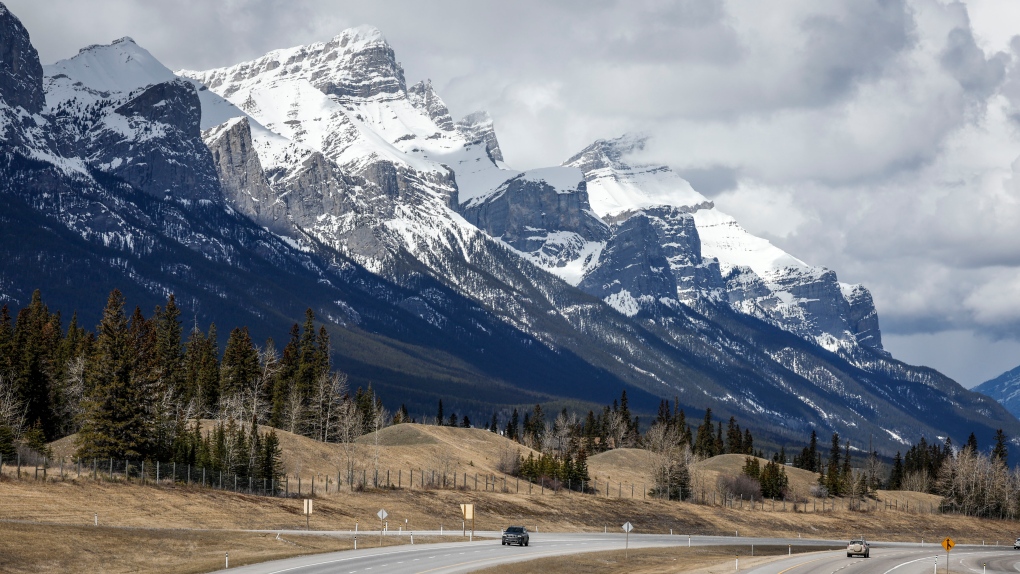Early snowmelt in Western mountains means drier summers, more wildfire risk: study
 Traffic travels along the Trans Canada Highway past Mount Rundle of the Rocky Mountains near Canmore, Alta., Monday, April 24, 2023.THE CANADIAN PRESS/Jeff McIntosh
Traffic travels along the Trans Canada Highway past Mount Rundle of the Rocky Mountains near Canmore, Alta., Monday, April 24, 2023.THE CANADIAN PRESS/Jeff McIntosh
VANCOUVER - Leaner snowpack in Western Canada and United States mountain ranges is causing drier summers and increasing wildfire risk, says a new study from the University of Colorado Boulder.
Lead author Kate Hale said her team analyzed mountain snow data and found snowpack water storage decreased more than 25 per cent from 1950 to 2013. This, she said, can be attributed to earlier snowmelt, less snowfall and more rain.
“We actually saw some of the strongest signals up in the Canadian Rockies, by way of this decrease in snowfall and then earlier snowmelts and rainfall generation,” Hale said in an interview.
Snowmelt serves as the primary water resource in western mountain regions, the study says. The ranges store snow throughout the winter, which then melts during spring and summer months when demand for water peaks.
Hale said snow in these regions typically wouldn't start melting until late May or June, but has begun showing signs of snow thawing as early as March.
Such a shift in snowmelt may pose challenges for residents as much of the infrastructure in these regions were designed to adapt to when water becomes available, Hale said.
“The snowmelts are providing most of the downstream water resources, such that if there is more snowmelt occurring earlier in the year, that means there will be less available for later in the year,” she said.
Holly Chubb, a climate researcher at the University of British Columbia, agreed, saying a serious decline in the snowpack would cause “cascading issues” for energy security in B.C.
“We rely on hydroelectric power as a major source to power our businesses, our homes and our schools, and the hydroelectric power is generally fed from the glacier, which fills our reservoirs,” she said in an interview.
“We may have to really adjust our usage, our consumption, and think about actually how we are utilizing hydro power in B.C.”
She said changes in snowmelt may impact soil and lead to an increase in the size and duration of wildfires.
It could also disrupt wildlife, she added. For instance, she said early snowmelt could shift the volume and temperature of rivers, which could prevent fish from spawning and reduce the province's salmon population.
“All of this information about the timing of snow melting is really, really essential to our cultural, economic and general energy security in British Columbia,” she said.
She suggested governments follow advice from Indigenous leaders.
“They have seen the changes in this landscape for thousands of years,” she said. “They have a deep knowledge and relationship with the land, with salmon, with bears that we do not have and that knowledge system is incredibly valuable.”
This report by The Canadian Press was first published May 28, 2023.
This story was produced with the financial assistance of the Meta and Canadian Press News Fellowship.
CTVNews.ca Top Stories

B.C. tenants evicted for landlord's use after refusing large rent increase to take over neighbouring suite
Ashley Dickey and her mother rented part of the same Coquitlam duplex in three different decades under three different landlords.
Mountain guide dies after falling into a crevasse in Banff National Park
A man who fell into a crevasse while leading a backcountry ski group deep in the Canadian Rockies has died.
Expert warns of food consumption habits amid rising prices
A new survey by Dalhousie University's Agri-Food Analytics Lab asked Canadians about their food consumption habits amid rising prices.
MPP Sarah Jama asked to leave Ontario legislature for wearing keffiyeh
MPP Sarah Jama was asked to leave the Legislative Assembly of Ontario by House Speaker Ted Arnott on Thursday for wearing a keffiyeh, a garment which has been banned at Queen’s Park.
Charlie Woods, son of Tiger, shoots 81 in U.S. Open qualifier
Charlie Woods failed to advance in a U.S. Open local qualifying event Thursday, shooting a 9-over 81 at Legacy Golf & Tennis Club.
Ex-tabloid publisher testifies he scooped up possibly damaging tales to shield his old friend Trump
As Donald Trump was running for president in 2016, his old friend at the National Enquirer was scooping up potentially damaging stories about the candidate and paying out tens of thousands of dollars to keep them from the public eye.
Here's why provinces aren't following Saskatchewan's lead on the carbon tax home heating fight
After Prime Minister Justin Trudeau said the federal government would still send Canada Carbon Rebate cheques to Saskatchewan residents, despite Saskatchewan Premier Scott Moe's decision to stop collecting the carbon tax on natural gas or home heating, questions were raised about whether other provinces would follow suit. CTV News reached out across the country and here's what we found out.
Montreal actress calls Weinstein ruling 'discouraging' but not surprising
A Montreal actress, who has previously detailed incidents she had with disgraced Hollywood producer Harvey Weinstein, says a New York Court of Appeals decision overturning his 2020 rape conviction is 'discouraging' but not surprising.
Caleb Williams, Jayden Daniels and Drake Maye make it four NFL drafts with quarterbacks going 1-3
Caleb Williams is heading to the Windy City, aiming to become the franchise quarterback Chicago has sought for decades.

































